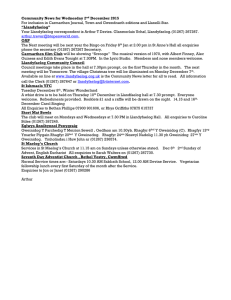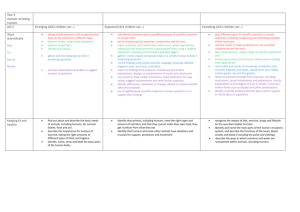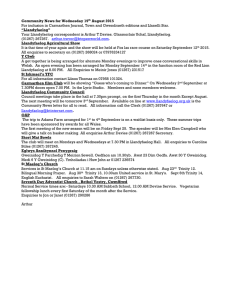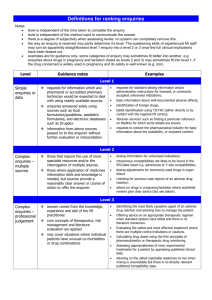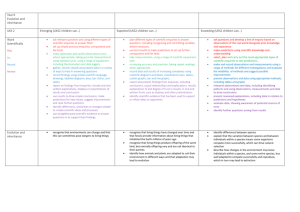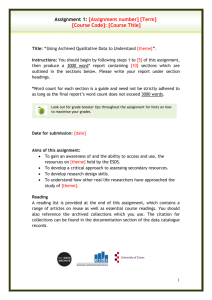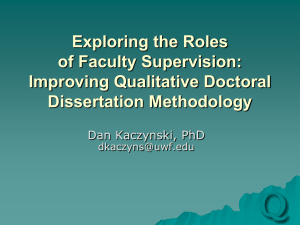Sources of secondary analysis for social work research
advertisement
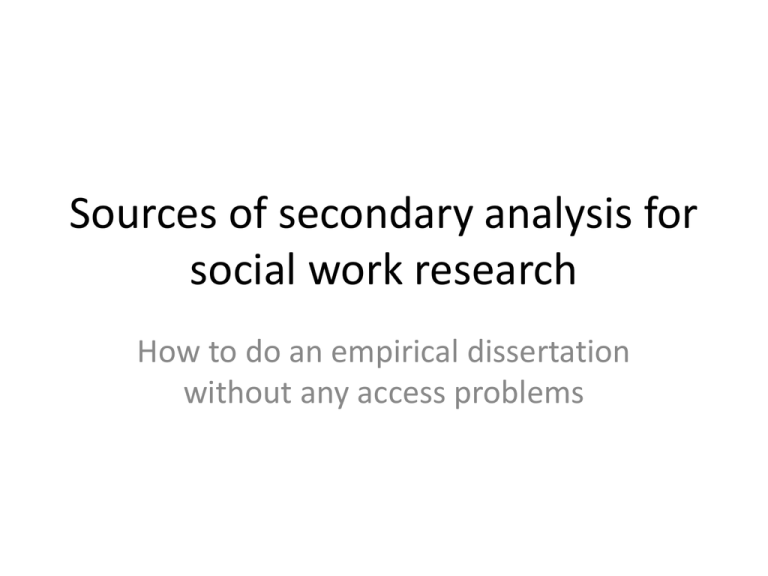
Sources of secondary analysis for social work research How to do an empirical dissertation without any access problems When dissertation research goes well • The topic really interests you • There is plenty of rich data • Perhaps the research is of particular interest to your employers or placement providers as well • You learn something new and feed this back to local practitioners and/or service users When problems arise • Data collection is very difficult to achieve • The host organisation (gatekeeper) says no – research access is refused • The host organisation says yes in principle but very few individuals agree to take part in your research – This can lead to poor quality research – Poor quality research could be seen as wasting your research participants’ time Why does this happen? • Social workers are busy with their core tasks and do not see student (or any) research as a priority – understandably enough • Social services departments have little research culture • There are so many layers of bureaucracy to go through, it is impossible to make direct contact with potential research participants There are other options • Archived data sets – 1. Quantitative – 2. Qualitative • Research with publicly-available documents – 3. Research on enquiries and policy documents – 4. Research on research – 5. Research on media • Anonymised data from social work organisations 1. Archived quantitative data • You need some statistical skills, and ideally be able to do multi-variable analysis • There are some excellent freely-available datasets • Locate studies via the UK Data Service Variable and Question Bank: http://discover.ukdataservice.ac.uk/variables (for starters, try typing “child abuse”) • Explore data via Nesstar: http://nesstar.esds.ac.uk/webview/index.jsp There is free access unless you want to do cross-tabulations, in which case you need to register using your university ID http://esds.ac.uk/newRegistration/newLogin.asp. • This registration should also let you download data sets. You will have to fill in a form for this stating what your purpose is. Which studies? • Search / browse and have a look • Bear in mind there are relatively few variables about social workers. Still plenty of potential for SW dissertations. • See Maxwell et al. (2012) for a list of cohort/panel studies which do have social work variables, e.g. – Millennium Cohort Study – British Household Panel Study • Also cross-sectional studies, e.g. – British Social Attitudes Survey (annual) – SN 5280 -Mental Health of Young People Looked After by Local Authorities in Great Britain, 2001-2003 • Example: Cheung and Buchanan (1997) 2. Archived qualitative data • Qualitative and mixed methods studies via the UK Data Service http://ukdataservice.ac.uk/get-data/keydata.aspx#/tab-qualitative-mixed-methods • e.g. click on link ‘discover qualitative and mixed methods data’ and then type “social work” (with inverted commas) • The archive includes classic studies such as Dingwall et al.’s The Protection of Children and Townsend’s The Last Refuge, as well as more recent studies. • Bear in mind age and usability of data. Historical research is fine, but documents may be harder to read. • Many will be very large datasets. • Example: Evans and Thane (2006) 3. Research on enquiries and policy documents • These days, public enquiries publish evidence on-line. • e.g. Victoria Climbie Data Corpus Online: http://victoriaclimbie.hud.ac.uk/index.html • This is just one example. Also look at government reports where they publish evidence submitted and/or responses to consultations • Discourse analysis of policy documents relating to an aspect of social work (e.g. Humphries, 1997) • See Gibbs and Hall (2007) on enquiries and references here: http://victoriaclimbie.hud.ac.uk/literature.html 4. Research on research • What kind of social work research is going on? Method, topic etc. • Who is doing it and where? • Who is citing whom? • e.g. Slater et al. (2013) 5. Research on media • Media coverage of social work or of a specific issue (e.g. mental health). • For newspapers, use Lexis Nexis or similar database • Study of publicly-accessible social media – e.g. using Twitter searches to follow debate on a hot topic in social work. • e.g. Henderson and Franklin (2007) on TV drama Another option – administrative data • Neither data which you yourself generate or data which are publicly available • Data which are already collected by agencies and which can be made available to you as an anonymised data set, so no permissions needed. • Care needed to ensure real anonymity – e.g. DoB (but you might need some kind of data on age) • e.g. Winter and Connolly (2005) References Cheung, S-Y. and Buchanan, A. (1997) High malaise scores in adulthood of children and young people who have been in care. Journal of Child Psychology and Psychiatry 38: 575-580. Evans, T. and Thane, P. (2006) Secondary Analysis of Dennis Marsden Mothers Alone. Methodological Innovations Online 1(2) 78-82. Gibbs, G.R. and Hall, C. (2007) The research potential of testimony from public inquiry websites. Children and Society 21, 69–79. Henderson L. and Franklin, B. (2007) Sad not bad: Images of social care professionals in popular UK television drama. Journal of Social Work, 7(2), 133-153. Humphries, B. (1997) Reading social work competing discourses in the Rules and Requirements for the Diploma in Social Work British Journal of Social Work 27(5): 641-658. Maxwell, N., Scourfield, J., Gould, N. and Huxley, P. (2012) UK panel data on social work service users. British Journal of Social Work 42 (1): 165-184. Slater, T., Scourfield, J. and Sloan, L. (2012) Who is citing whom in social work? A response to Hodge, Lacasse and Benson. British Journal of Social Work. 42 (8): 16261633. Winter, K. and Connolly, P. (2005) A small-scale study of the relationship between measures of deprivation and child-care referrals. British Journal of Social Work 35(6): 937-952
